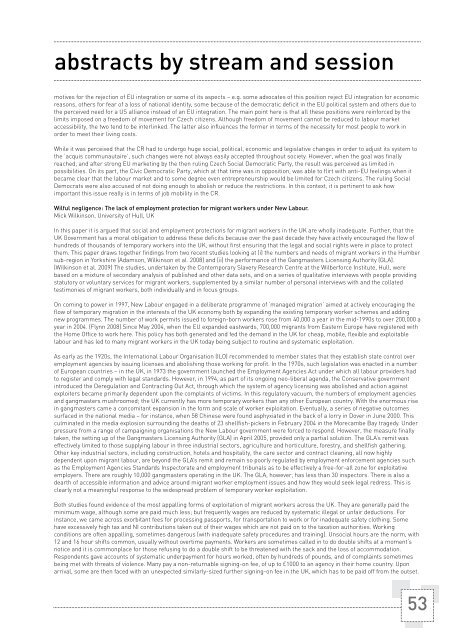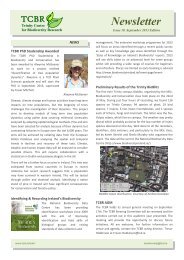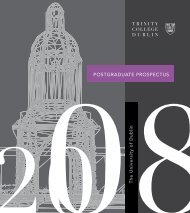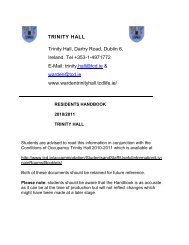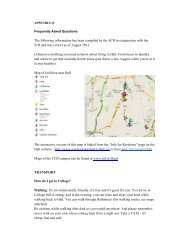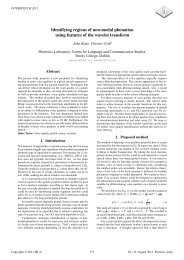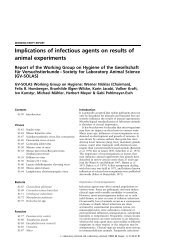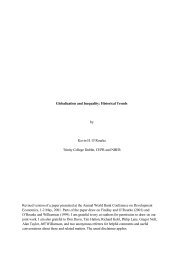Conference Programme (PDF, 1019KB) - Trinity College Dublin
Conference Programme (PDF, 1019KB) - Trinity College Dublin
Conference Programme (PDF, 1019KB) - Trinity College Dublin
You also want an ePaper? Increase the reach of your titles
YUMPU automatically turns print PDFs into web optimized ePapers that Google loves.
abstracts by stream and session<br />
motives for the rejection of EU integration or some of its aspects – e.g. some advocates of this position reject EU integration for economic<br />
reasons, others for fear of a loss of national identity, some because of the democratic deficit in the EU political system and others due to<br />
the perceived need for a US alliance instead of an EU integration. The main point here is that all these positions were reinforced by the<br />
limits imposed on a freedom of movement for Czech citizens. Although freedom of movement cannot be reduced to labour market<br />
accessibility, the two tend to be interlinked. The latter also influences the former in terms of the necessity for most people to work in<br />
order to meet their living costs.<br />
While it was perceived that the CR had to undergo huge social, political, economic and legislative changes in order to adjust its system to<br />
the ‘acquis communautaire’, such changes were not always easily accepted throughout society. However, when the goal was finally<br />
reached, and after strong EU marketing by the then ruling Czech Social Democratic Party, the result was perceived as limited in<br />
possibilities. On its part, the Civic Democratic Party, which at that time was in opposition, was able to flirt with anti-EU feelings when it<br />
became clear that the labour market and to some degree even entrepreneurship would be limited for Czech citizens. The ruling Social<br />
Democrats were also accused of not doing enough to abolish or reduce the restrictions. In this context, it is pertinent to ask how<br />
important this issue really is in terms of job mobility in the CR.<br />
Wilful negligence: The lack of employment protection for migrant workers under New Labour.<br />
Mick Wilkinson, University of Hull, UK<br />
In this paper it is argued that social and employment protections for migrant workers in the UK are wholly inadequate. Further, that the<br />
UK Government has a moral obligation to address these deficits because over the past decade they have actively encouraged the flow of<br />
hundreds of thousands of temporary workers into the UK, without first ensuring that the legal and social rights were in place to protect<br />
them. This paper draws together findings from two recent studies looking at (i) the numbers and needs of migrant workers in the Humber<br />
sub-region in Yorkshire (Adamson, Wilkinson et al. 2008) and (ii) the performance of the Gangmasters Licensing Authority (GLA).<br />
(Wilkinson et al. 2009) The studies, undertaken by the Contemporary Slavery Research Centre at the Wilberforce Institute, Hull, were<br />
based on a mixture of secondary analysis of published and other data sets, and on a series of qualitative interviews with people providing<br />
statutory or voluntary services for migrant workers, supplemented by a similar number of personal interviews with and the collated<br />
testimonies of migrant workers, both individually and in focus groups.<br />
On coming to power in 1997, New Labour engaged in a deliberate programme of ‘managed migration’ aimed at actively encouraging the<br />
flow of temporary migration in the interests of the UK economy both by expanding the existing temporary worker schemes and adding<br />
new programmes. The number of work permits issued to foreign-born workers rose from 40,000 a year in the mid-1990s to over 200,000 a<br />
year in 2004. (Flynn 2008) Since May 2004, when the EU expanded eastwards, 700,000 migrants from Eastern Europe have registered with<br />
the Home Office to work here. This policy has both generated and fed the demand in the UK for cheap, mobile, flexible and exploitable<br />
labour and has led to many migrant workers in the UK today being subject to routine and systematic exploitation.<br />
As early as the 1920s, the International Labour Organisation (ILO) recommended to member states that they establish state control over<br />
employment agencies by issuing licenses and abolishing those working for profit. In the 1970s, such legislation was enacted in a number<br />
of European countries – in the UK, in 1973 the government launched the Employment Agencies Act under which all labour providers had<br />
to register and comply with legal standards. However, in 1994, as part of its ongoing neo-liberal agenda, the Conservative government<br />
introduced the Deregulation and Contracting Out Act, through which the system of agency licensing was abolished and action against<br />
exploiters became primarily dependent upon the complaints of victims. In this regulatory vacuum, the numbers of employment agencies<br />
and gangmasters mushroomed; the UK currently has more temporary workers than any other European country. With the enormous rise<br />
in gangmasters came a concomitant expansion in the form and scale of worker exploitation. Eventually, a series of negative outcomes<br />
surfaced in the national media – for instance, when 58 Chinese were found asphyxiated in the back of a lorry in Dover in June 2000. This<br />
culminated in the media explosion surrounding the deaths of 23 shellfish-pickers in February 2004 in the Morecambe Bay tragedy. Under<br />
pressure from a range of campaigning organisations the New Labour government were forced to respond. However, the measure finally<br />
taken, the setting up of the Gangmasters Licensing Authority (GLA) in April 2005, provided only a partial solution. The GLA’s remit was<br />
effectively limited to those supplying labour in three industrial sectors, agriculture and horticulture, forestry, and shellfish gathering.<br />
Other key industrial sectors, including construction, hotels and hospitality, the care sector and contract cleaning, all now highly<br />
dependent upon migrant labour, are beyond the GLA’s remit and remain so poorly regulated by employment enforcement agencies such<br />
as the Employment Agencies Standards Inspectorate and employment tribunals as to be effectively a free-for-all zone for exploitative<br />
employers. There are roughly 10,000 gangmasters operating in the UK. The GLA, however, has less than 30 inspectors. There is also a<br />
dearth of accessible information and advice around migrant worker employment issues and how they would seek legal redress. This is<br />
clearly not a meaningful response to the widespread problem of temporary worker exploitation.<br />
Both studies found evidence of the most appalling forms of exploitation of migrant workers across the UK. They are generally paid the<br />
minimum wage, although some are paid much less; but frequently wages are reduced by systematic illegal or unfair deductions. For<br />
instance, we came across exorbitant fees for processing passports, for transportation to work or for inadequate safety clothing. Some<br />
have excessively high tax and NI contributions taken out of their wages which are not paid on to the taxation authorities. Working<br />
conditions are often appalling, sometimes dangerous (with inadequate safety procedures and training). Unsocial hours are the norm, with<br />
12 and 16 hour shifts common, usually without overtime payments. Workers are sometimes called in to do double shifts at a moment’s<br />
notice and it is commonplace for those refusing to do a double shift to be threatened with the sack and the loss of accommodation.<br />
Respondents gave accounts of systematic underpayment for hours worked, often by hundreds of pounds, and of complaints sometimes<br />
being met with threats of violence. Many pay a non-returnable signing-on fee, of up to £1000 to an agency in their home country. Upon<br />
arrival, some are then faced with an unexpected similarly-sized further signing-on fee in the UK, which has to be paid off from the outset.<br />
53


